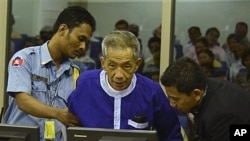The former chief jailer of Cambodia's notorious Khmer Rouge has taken the witness stand at the war crimes tribunal trying senior leaders of the former regime. Kaing Guek Eav, known by his alias, Duch, is the only person so far to have been convicted by the United Nations-backed tribunal for crimes during the Khmer Rouge era. Now, he will be expected to provide crucial testimony against his former superiors.
During questioning Monday, Duch said he was the reluctant head of an early Khmer Rouge prison, called M-13. Duch testified through a court interpreter that even before the Khmer Rouge came to power in 1975, the regime used this center to interrogate, torture and kill.
"Anyone who infiltrated into the liberated zone could be perceived as an enemy and had to be smashed accordingly," he said.
Duch said one of his immediate superiors instructed him how to interrogate prisoners: how to torture them using electrical wiring, water-boarding techniques and suffocation.
"And the best way he liked most was to use a plastic bag to cover the heads of those people. He said, 'You, comrade, need to look at their neck and see if it’s shaking' - the pulse of the neck. If it was vibrating very strongly, they would be considered as spies," said Duch.
These were the same techniques Duch taught to his subordinates, then later brought to S-21, the notorious torture center in Phnom Penh. Duch was convicted of being responsible for the deaths of more than 12,000 people who passed through its walls.
That makes him a potentially crucial witness in the current trial of three top Khmer Rouge leaders, who have largely downplayed their own leadership roles in previous testimony.
Clair Duffy is a trial observer with the Open Society Justice Initiative.
"People who are alleged to be right at the heart of these kinds of events are going to do everything they can to minimize their role or their level of authority. Other people who have been as close to the heart of things, as Duch was, will essentially have been uniquely placed to know what was going on at that level of leadership," said Duffy.
Outside the trial chambers, however, the tribunal itself continues to face turbulence. On Monday, the court's international co-investigating judge quit, deploring what he called a "dysfunctional situation" within the court. His highly criticized predecessor resigned only months ago, citing a prevailing perception of government interference.
News
Convicted Khmer Rouge Jailer Testifies Against Former Superiors
- By Irwin Loy




